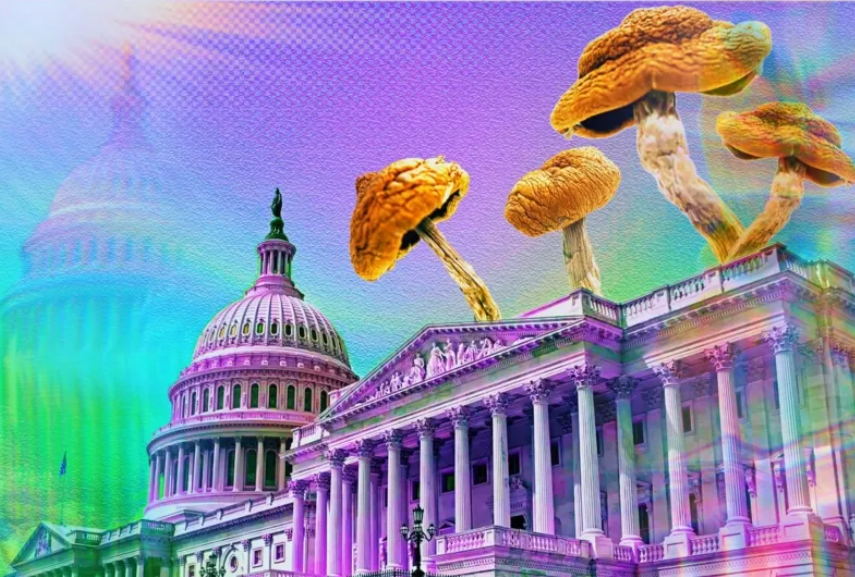
RESEARCH
Psilocybin May Help Treat Nicotine Withdrawal in Mice
According to several studies presented at the Neuroscience 2023 press conference, psilocybin was able to treat nicotine withdrawal in mice, leading to fewer symptoms of withdrawal after treatment with the compound. Researchers tested the theory on two samples of mice: one was genetically modified to not express 5HT2A receptors which prevented psilocybin from affecting them, and the other sample had non-modified mice. While the modified mice did not see a change in nicotine withdrawal, the non-modified sample expressed a reduction in withdrawal symptoms and reduced the somatic signs of nicotine withdrawal and nicotine-conditioned reward in mice.
This is not the first study to demonstrate that psilocybin can be an effective treatment for smoking cessation.
A 2014 study by the Johns Hopkins University’s School of Medicine found that psilocybin in the context of a cognitive behavioral therapy treatment program could help long-time smokers to quit smoking after multiple failed attempts with 80% of participants remaining abstinent six months later. The study demonstrated a significantly higher success rate compared to other smoking cessation trials. Will psilocybin patches replace Nicorette in the future? Perhaps…
Read more here.
A Harvard-Affiliated Hospital Is Testing Psilocybin’s Capability to Help Dying Patients Face Death
Researchers at Dana-Farber Cancer Institute’s Psychedelic-Assisted Therapy program are conducting a small trial to test synthetic psilocybin in patients who have six months or less to live and suffer from terminal illnesses, such as cancer and heart disease.
The study, which began in 2022 has now tested the tolerability and effectiveness of a single dose of psilocybin on eight patients, six of whom have now passed. The trial is expected to be completed next year, after dosing two more patients.
Read more here.
Personality Disorders: A Major X-Factor in Psychedelic Therapy
A study conducted by Imperial College of London’s team, found that a substantial minority (16%) of psychedelic explorers experienced diminished mental health in the weeks following the journey. As it seems, having a personality disorder may put people at higher risk of psychological harm.
The study looked at 807 people across three web-based survey studies. In nearly every cohort, including the “healthy normals,” a notable portion responded negatively. However, personality disorder (PD) was the single most significant predictor of mental harm (31.2%), followed by psychotic disorders (25%).
Controlling for confounding factors, people with personality disorders were four times likelier to experience mental decline than the remaining population. And the true number might be even higher.
Read more here.
POLICY
EU Policymakers Support Research into Psychedelics to Treat Mental Health Disorders
A group of Members of the European Parliament (MEPs) is pushing for better regulatory pathways to psychedelic-assisted therapies for the treatment of psychiatric disorders. The group is exploiting the current revision of the pharmaceutical package in the European Parliament to promote the potential benefits of psychedelics in the mental healthcare system. Supported by other entities, such as Psychedelic Access Research and European Alliance (PAREA) and PsychedelicsEUROPE association, the group puts a focus on the necessity of regulatory frameworks and late-stage trials in Europe to avoid falling behind. The pharmaceutical reform’s aim is to broaden regulatory data protection but psychedelics’ pharmacological characteristics are presenting challenges.
Read more here.
Oregon Releases New Draft Rules for Psilocybin Data Collection Practices
Oregon’s new draft rules focus on introducing technical fix rules, training regulations, and data collection and reporting protocols. The aim of these measures is to establish a regulatory framework for the production and sales of licensed psilocybin products and services, as mandated by ORS 475A. Training rules emphasize the need of approval of the curriculum requirements for psilocybin training programs, and the training fixes focus on the ensuring clarity and efficiency for licensed practitioners and OPS.
Read more here.
Massachusetts Governor Proposes Bill to Study Psychedelic Treatments for Vets, Advocates Call for Legalization
On Veterans Day, Massachusetts Governor Maura Healey introduced the “HERO Act”, which aims to provide veterans with improved benefits and services. The bill has added a provision that proposes studying psychedelics’ health benefits for veterans and service-related mental and physical issues.
“Thank you, Governor Healey, for recognizing the importance of psilocybin. We need to substitute the proposed ballot measure with the legislation filed by Senator Jehlen, Rep. Sabadosa, and Rep. Boldyga so that veterans are not charged $4,000 or more for psychedelic treatments like they are in Oregon,” remarked James Davis, the cofounder of Bay Staters for Natural Medicine and former staffer to the state’s Joint Committee on Cannabis Policy.
Read more here.
CULTURE
Wonderland Miami 2023: New Psychedelic Marvels, Practical Business Updates
The Wonderland Miami 2023 Conference, November 9-11, featured over 250 speakers, 60 exhibitors, and approximately 5,000 attendees. This year, attendees and presenters delved into the latest psychedelic research and psychedelics’ potential to improve human health and wellness. One of the most interesting topics, however, explored psychedelics’ role in extending life. Other discussions included technological discoveries, and the microbiome’s impact on the production of serotonin. Notably, the conference included discussions about the intersection of AI, psychedelics, and longevity.
“The human body is really about designed obsolescence,” McClure said. “If you can wash out the system good enough, then you should be able to extend the lifespan. So let’s wash it and put it in the dishwasher and see if we can get some of the pathogens out and continue to use it,” said Scotch McClure, CEO and chairman of Maxwell Biosciences.
Read full story here.





